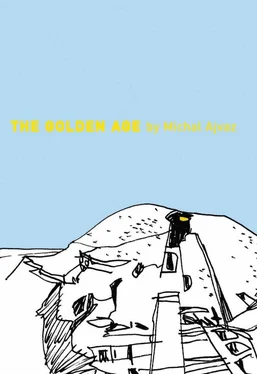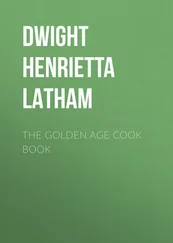Michal Ajvaz - The Golden Age
Здесь есть возможность читать онлайн «Michal Ajvaz - The Golden Age» весь текст электронной книги совершенно бесплатно (целиком полную версию без сокращений). В некоторых случаях можно слушать аудио, скачать через торрент в формате fb2 и присутствует краткое содержание. Год выпуска: 2010, Издательство: Dalkey Archive Press, Жанр: Современная проза, на английском языке. Описание произведения, (предисловие) а так же отзывы посетителей доступны на портале библиотеки ЛибКат.
- Название:The Golden Age
- Автор:
- Издательство:Dalkey Archive Press
- Жанр:
- Год:2010
- ISBN:нет данных
- Рейтинг книги:4 / 5. Голосов: 1
-
Избранное:Добавить в избранное
- Отзывы:
-
Ваша оценка:
- 80
- 1
- 2
- 3
- 4
- 5
The Golden Age: краткое содержание, описание и аннотация
Предлагаем к чтению аннотацию, описание, краткое содержание или предисловие (зависит от того, что написал сам автор книги «The Golden Age»). Если вы не нашли необходимую информацию о книге — напишите в комментариях, мы постараемся отыскать её.
is Michal Ajvaz’s greatest and most ambitious work.
The Golden Age
The Golden Age — читать онлайн бесплатно полную книгу (весь текст) целиком
Ниже представлен текст книги, разбитый по страницам. Система сохранения места последней прочитанной страницы, позволяет с удобством читать онлайн бесплатно книгу «The Golden Age», без необходимости каждый раз заново искать на чём Вы остановились. Поставьте закладку, и сможете в любой момент перейти на страницу, на которой закончили чтение.
Интервал:
Закладка:
“There’s something important I forgot to mention. I spent a long time considering which material you should work in.” Mii has stopped and turned back. She knows she is about to learn what evil plan Taal has thought up. “I ruled out all varieties of stone and metal. I spent a lot of time considering rare woods, but all of them seemed too crude for a statue that should be an expression of the soul of my son. In the end I decided to have the statue made of water. You have three months in which to complete it. You may start work immediately.”
“You wish me to make a statue out of water?” Mii’s dismayed voice calls out into the dark towards where she believes Taal to be.
“Indeed. And of course I don’t mean snow or ice. Nor will I allow the water to be in any container that gives the statue its shape. But I suppose the material needn’t be water. Any liquid will do. I would quite like a statue made of aromatic oils, but I shall leave the choice to you. There’s surely no need for me to tell you that failure to obey the royal command is punishable by death.”
Mii knows this very well. She knows, too, that there is no point objecting that it is impossible to make a statue out of water or any other liquid, so she does not even attempt this. There she stands in the middle of the hall thinking desperately what she should do, but it seems to her she has no alternative but to wait in Taal’s palace for three months for death to arrive. But then something comes to her from deep in her memory; it contains the germ of an idea (at first foggy, but becoming ever clearer) for how Taal might be outsmarted. Mii knows that she must somehow get Taal to modify the task without ever suspecting there is a trick involved. She must induce the king to make a small change to the commission that will appear to him as nothing more than a meaningless elaboration, and she must get him to do so before she quits the hall. She begins to speak before she has a clear idea of how to proceed; her plan comes into being as she describes it in words. She walks back through the hall towards Taal; her voice is weak because she is more used to whispering to marble statues than to conversing with people. To begin with she is practically shouting, but still the king must lean forward so that he can hear her, and in so doing his face emerges from the darkness. The closer Mii gets to the king, the quieter her voice becomes. The king falls back into his armchair and the darkness.
“Very well, Your Majesty, I’ll try to make a statue out of some kind of liquid,” she says as she walks. “But there is one thing I need to get straight before I start working. There are thicker liquids and runnier pastes, aren’t there? What I mean to say is that it is not always clear where to draw the line between what is a liquid and what is a solid, and I wouldn’t like to think we might argue this point once the statue is finished. I suggest we agree beforehand what we consider a liquid on the basis of a simple and clear criterion, such as…” (as she walks, Mii pretends to be pondering on this) “…such as whether fish are able to live in the material the statue is made of.”
By now Mii is again standing before Taal’s chair, hidden though it is by the dark. Her plan for how to escape death was completed when she spoke her last word and took her last step. Taal is mistrustful and he takes a while to consider her proposal, but he finds nothing in it that could make the statue any easier to produce and thus jeopardize his intentions; on the contrary, it seems to Taal that in her panic Mii has made the task still harder for herself. So he replies, “Very well, it is your task to create a statue from a material in which fish are able to live.” He promises Mii that no one apart from her assistants will see the statue until it has been completed. Then he dismisses her.
As she stood before the king, Mii was remembering a marvellous lake that was hidden high in the hills of the small island on which she spent her childhood. After thousands of years of a gradual drying out, the water of this lake thickened into a kind of jelly. In the lake there lived predatory fish that darted out of the water to feed on birds that came too close to the surface. The fish would bite into the birds and pull them into the jelly, before stripping off all the flesh so that only the skeleton remained. Because it had taken such a long time for the water to thicken, the fish had had plenty of time to adapt to the changing conditions. Unlike the African lungfish (protopterus annectens) — which has created some kind of ersatz lungs for itself and will soon drown in water if it cannot get to the air above the surface — they did not convert to the breathing of atmospheric oxygen; the fish of the lake still breathed with their gills, which had adapted themselves entirely to the jelly and were very well able to exploit the small quantities of oxygen the jelly contained. It was difficult to decide whether the nimble movement of the fish in the jelly was swimming or burrowing. (The burrows disappeared immediately, of course, because the jelly closed as soon as the fish had passed through it — if you find this difficult to picture, try moving a spoon about in a blancmange.) Mii knows that the jelly is solid enough to make a statue out of, as the villagers living around the lake make quaking jelly statues for sale at the market in the capital.
A tent in the courtyard
Mii immediately sends her assistants to the island for barrels of jelly and fish from the lake. Then she begins to read Fo’s book. She is perhaps the only person in the kingdom who has not yet read it. Mii never reads books: the worlds in which she lives are so full of characters and stories that no more faces, bodies and stories could fit into them. But now she is in the company of dead Prince Fo, walking the corridors of the uncompleted palace, which is now slowly closing in on itself; the outlines of unfinished statues have befriended and merged with the spaces around them. Mii immerses herself in the vision born out of Fo’s solitude, sickness and despair.
And Mii is enchanted by the book. As in a dull metallic mirror, she recognizes her own face in the joyous child’s face of Isili and the noble gold, diamond-spangled face of Nus. In his many characters she gets to know Fo’s features and gestures, which were nothing to her while he was alive but a blurry backdrop to her nascent statues. They are made manifest not only in Dru’s wanderings and the process of his disengagement from the Earth, but also in the vigilant glances, whispers and light steps of the Vauz conspirators, and even in the elegant unfurling and recoiling of the squid’s tentacles. She identifies the rhythms of Fo’s blood in the undulation of the ocean’s surface and the dumb rotation of the stars around the centre of a distant galaxy. And this polymorphous but homogeneous pulsation, which goes deep into the bodies of the sentences and itself exploits the movements of these dark bodies, makes Mii think of something she knows from her own experience — that behind every work of art there are two things intermingling, each referring to the other: the face of the author, the features of which are drawn from the universe at large, and the universe, which appears in the mirror of the face.
It seems to her that the characters, stories and landscapes create together a picture of Fo’s mind, and that, had he never begun to write, Fo would never have encountered himself or the real world. Mii, who hears talk of separation from real life in connection with her own work all the time, knows very well that only at the bottom of our most personal myths, which we ourselves do not understand, only where these myths feed on juices flowing in the weave of real things and there recognize their cosmic names, do we encounter the true voice of the world. She wants to laugh when she reads of the wait for “a great societal statuary” after the installation of a new regime in Kass; she knows that the voice of the world speaks only through these nonsensical myths, that only its pictures, which take nothing from the world, are the hieroglyphs in which the world writes its secrets, just as it is only possible to write the word table using strange characters that bear little resemblance to the table itself.
Читать дальшеИнтервал:
Закладка:
Похожие книги на «The Golden Age»
Представляем Вашему вниманию похожие книги на «The Golden Age» списком для выбора. Мы отобрали схожую по названию и смыслу литературу в надежде предоставить читателям больше вариантов отыскать новые, интересные, ещё непрочитанные произведения.
Обсуждение, отзывы о книге «The Golden Age» и просто собственные мнения читателей. Оставьте ваши комментарии, напишите, что Вы думаете о произведении, его смысле или главных героях. Укажите что конкретно понравилось, а что нет, и почему Вы так считаете.












